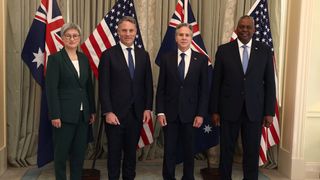Last weekend US Secretary of Defense Lloyd Austin and Secretary of State Antony Blinken met with their Australian counterparts in Brisbane for the 33rd iteration of the Australia-US Ministerial Consultations, AUSMIN. The annual event brought several announcements for Australia-US cooperation and occurred alongside Blinken’s first visit to New Zealand, remarks at Brisbane’s Gender Equality Symposium and the largest ever Exercise Talisman Sabre.
USSC Non-Resident Senior Fellow Stephen Loosley shares his insights on the key takeaways and broader significance of US engagement Down Under.
Stephen, could you set the scene for us? What stood out to you in the gathering of US and Australian security and defence principals?
I might begin by casting our minds back to an ANZUS meeting held in the 1980s, at San Francisco’s historic Presidio building. The Australian side was primarily represented by then Defence Minister, Kim Beazley, and the Americans by Secretary of Defence, Caspar W. Weinberger.
There was some tension during the discussions, and voices were raised over some of the issues confronting ANZUS. Raised voices escalated into shouting until there came a tap at the door. A humble US military officer opened the door and said: “Mr Secretary, I’m sorry to disturb you but are you aware that your discussion can be heard all over the building?”
“Thank you,” said Secretary Weinberger. “We will tone it down.” And they did.
Voices are seldom raised at contemporary AUSMIN gatherings such as the one convened recently. Indeed, one close observer stated that the gathering was “bland” in tone. Bland is fine for diplomatic meetings on sensitive topics, and heaven alone knows there was a raft of such topics on the agenda at this year’s consultations, including the Taiwan Straits, AUKUS, contested relations in the South Pacific and the impact of the Ukraine war.
Broadly speaking there was substantial agreement among the participants, US Secretary of State Antony Blinken and Secretary of Defense Lloyd Austin III, Australian Deputy Prime Minister and Minister for Defence Richard Marles and Minister for Foreign Affairs Penny Wong.
The participants know each other and there is a fair amount of trust undergirding the relationship. All have been very active in recent times, including in the South Pacific, with visits at the ministerial level almost becoming routine.
But this is not to say that there aren’t differences in emphasis. In the discussions, the Americans in particular were keen to offer a more robust approach on Taiwan. Australians demurred, but there is no question that an attack by Beijing on the island state would be met, not only by fierce local resistance, but by a powerful response by the United States, Japan, and Australia, amongst others. This should be taken as a given in Asia-Pacific policy.
What do you make of Antony Blinken’s recent comments that “the door is very much open” for New Zealand and other partners to engage on AUKUS going forward?
Prior to the AUSMIN gathering in Brisbane, Secretary of State Blinken raised a few eyebrows by offering the view that the door of AUKUS was open to New Zealand. Now, it is true that foreign ministers should always show courtesy to their hosts. A seasoned diplomat once offered the opinion that a foreign minister should never say “no,” but should prefer the term “perhaps” to the negative.
The Kiwis have a serious diplomatic capacity in the South Pacific, and this is to be respected. But there will soon be US, British and ultimately Australian nuclear-powered submarines in our waters. This intruding strategic reality will confront the countervailing geographic reality of New Zealand ports being closed to such vessels. The impact upon AUKUS, including “Pillar Two,” is impossible to predict, but is unlikely to add momentum.
Zooming out, what can the tone and substance of these meetings tell us about the broader trajectory of Australia-US cooperation going forward?
At an AUSMIN dinner at Parliament House in Canberra, then US Secretary of State in the Clinton Administration, Warren M. Christopher, followed Australian Foreign Affairs Minister Gareth Evans to the podium. Christopher posed a rhetorical question: “Why is it that whenever I follow Gareth Evans to the microphone, I find that everything has been said?” This tongue-in-cheek remark was met with much laughter from both the Australians and the Americans present.
This year, AUSMIN was similarly good-humoured in its tone, but serious matters are being thrashed out as a consequence of strategic necessity.
Australia will be manufacturing missiles in cooperation with US defence suppliers for the US military and ultimately for friends and allies. This represents a major shift for the Australian defence industry. [Full disclosure, the writer is the Deputy Chair of Thales Australia].
But the missile decision must be seen in the context of shifting strategic circumstances in the Indo-Pacific. Closer cooperation between allies, especially the United States, Australia and Japan, is mandatory if peace and prosperity is to be preserved. AUSMIN in Brisbane played its role. This is a diplomatic foundation upon which the democracies can build further.






